A literature review is an overview of the previously published works on a specific topic. The term can refer to a full scholarly paper or a section of a scholarly work such as a book, or an article. Either way, a literature review is supposed to provide the researcher/author and the audiences with a general image of the existing knowledge on the topic under question. A good literature review can ensure that a proper research question has been asked and a proper theoretical framework and/or research methodology have been chosen.
To be precise, a literature review serves to situate the current study within the body of the relevant literature and to provide context for the reader. In such case, the review usually precedes the methodology and results sections of the work. Such work is outside the scope of this article, which focuses on literature reviews to inform reports of original medical education research. We define such a literature review as a synthetic review and summary of what is known and unknown regarding the topic of a scholarly body of work, including the current work's place within the existing knowledge. While this type of literature review may not require the intensive search processes mandated by systematic reviews, it merits a thoughtful and rigorous approach. A literature review is both a summary and explanation of the current state of knowledge on a focused topic as found in academic books, journal articles and all other sources connected to the subject of study.
Its aim is to provide an overview of sources you have explored while researching a particular topic and to demonstrate to your readers how your research fits within the larger field of study. Some disciplines require that you use information that is as current as possible. This is particularly true in disciplines in medicine and the sciences where research conducted becomes obsolete very quickly as new discoveries are made. However, when writing a review in the social sciences, a survey of the history of the literature may be required.
In other words, a complete understanding the research problem requires you to deliberately examine how knowledge and perspectives have changed over time. Sort through other current bibliographies or literature reviews in the field to get a sense of what your discipline expects. You can also use this method to explore what is considered by scholars to be a "hot topic" and what is not. Literature reviews are designed to provide an overview of sources you have explored while researching a particular topic and to demonstrate to your readers how your research fits within a larger field of study. It provides an overview of current knowledge, allowing you to identify relevant theories, methods, and gaps in the existing research. In the sciences, for instance, treatments for medical problems are constantly changing according to the latest studies.
Try sorting through some other current bibliographies or literature reviews in the field to get a sense of what your discipline expects. You can also use this method to consider what is currently of interest to scholars in this field and what is not. If you have limited time to conduct research, literature reviews can give you an overview or act as a stepping stone. For professionals, they are useful reports that keep them up to date with what is current in the field.
For scholars, the depth and breadth of the literature review emphasizes the credibility of the writer in his or her field. Literature reviews also provide a solid background for a research paper's investigation. Comprehensive knowledge of the literature of the field is essential to most research papers. Lit reviews can also be standalone pieces, either as assignments in a class or as publications. As a publication, a lit review usually is meant to help make other scholars' lives easier by collecting and summarizing, synthesizing, and analyzing existing research on a topic.
This can be especially helpful for students or scholars getting into a new research area, or for directing an entire community of scholars toward questions that have not yet been answered. Knowledge production within the field of business research is accelerating at a tremendous speed while at the same time remaining fragmented and interdisciplinary. This makes it hard to keep up with state-of-the-art and to be at the forefront of research, as well as to assess the collective evidence in a particular area of business research. This is why the literature review as a research method is more relevant than ever. Traditional literature reviews often lack thoroughness and rigor and are conducted ad hoc, rather than following a specific methodology. Therefore, questions can be raised about the quality and trustworthiness of these types of reviews.
This paper discusses literature review as a methodology for conducting research and offers an overview of different types of reviews, as well as some guidelines to how to both conduct and evaluate a literature review paper. It also discusses common pitfalls and how to get literature reviews published. There are a number of different situations where you might write a literature review, each with slightly different expectations; different disciplines, too, have field-specific expectations for what a literature review is and does. You should always look at examples from your own discipline and talk to professors or mentors in your field to be sure you understand your discipline's conventions, for literature reviews as well as for any other genre. Many search tools include options for viewing citations of selected articles.
Examining cited references provides additional articles for review and a sense of the influence of the selected article on its field. Literature refers to a collection of published information/materials on a particular area of research or topic, such as books and journal articles of academic value. However, your literature review does not need to be inclusive of every article and book that has been written on your topic because that will be too broad. Rather, it should include the key sources highlighting the main debates, trends and gaps in your specific research area. The level of detail or comprehensiveness of your literature review may depend on many things, but especially the purpose and audience of your review. A literature review, like a term paper, is usually organized around ideas, not the sources themselves as an annotated bibliography would be organized.
This means that you will not just simply list your sources and go into detail about each one of them, one at a time. As you read widely but selectively in your topic area, consider instead what themes or issues connect your sources together. How well do they present the material and do they portray it according to an appropriate theory? A literature review can be a part of a research paper or scholarly article, usually falling after the introduction and before the research methods sections.
In these cases, the lit review just needs to cover scholarship that is important to the issue you are writing about; sometimes it will also cover key sources that informed your research methodology. Thinking interdisciplinarily about a research problem can be a rewarding exercise in applying new ideas, theories, or concepts to an old problem. For example, what might cultural anthropologists say about the continuing conflict in the Middle East?
In what ways might geographers view the need for better distribution of social service agencies in large cities than how social workers might study the issue? You don't want to substitute a thorough review of core research literature in your discipline for studies conducted in other fields of study. However, particularly in the social sciences, thinking about research problems from multiple vectors is a key strategy for finding new solutions to a problem or gaining a new perspective. Consult with a librarian about identifying research databases in other disciplines; almost every field of study has at least one comprehensive database devoted to indexing its research literature. The most interesting literature reviews are often written as arguments (again, as mentioned at the beginning of the page, this is discipline-specific and doesn't work for all situations).
Often, the literature review is where you can establish your research as filling a particular gap or as relevant in a particular way. You have some chance to do this in your introduction in an article, but the literature review section gives a more extended opportunity to establish the conversation in the way you would like your readers to see it. You can choose the intellectual lineage you would like to be part of and whose definitions matter most to your thinking (mostly humanities-specific, but this goes for sciences as well). In addressing these points, you argue for your place in the conversation, which tends to make the lit review more compelling than a simple reporting of other sources.
Literature Review Means In Research To facilitate writing a literature review, journals are increasingly providing helpful features to guide authors. For example, the resources available through JGME include several articles on writing.17 The journal Perspectives on Medical Education recently launched "The Writer's Craft," which is intended to help medical educators improve their writing. Additionally, many institutions have writing centers that provide web-based materials on writing a literature review, and some even have writing coaches. When selecting references for the introduction consider those that illustrate core background theoretical and methodological concepts, as well as recent relevant studies. For the discussion, citations should be thoughtfully selected to compare and contrast the present study's findings with the current literature and to indicate how the present study moves the field forward. A good literature review summarises, analyses, evaluates and synthesises the relevant literature within a particular field of research.
It illuminates how knowledge has evolved within the field, highlighting what has already been done, what is generally accepted, what is emerging and what is the current state of thinking on the topic. Additionally, literature reviews identify the gaps in the current knowledge - that is, uninvestigated or under-researched areas. A review does not always focus on what someone said , but how they came about saying what they say . Reviewing methods of analysis provides a framework of understanding at different levels [i.e. This approach helps highlight ethical issues which you should be aware of and consider as you go through your own study. You've decided to focus your literature review on materials dealing with sperm whales.
This is because you've just finished reading Moby Dick, and you wonder if that whale's portrayal is really real. You start with some articles about the physiology of sperm whales in biology journals written in the 1980's. But these articles refer to some British biological studies performed on whales in the early 18th century. Then you look up a book written in 1968 with information on how sperm whales have been portrayed in other forms of art, such as in Alaskan poetry, in French painting, or on whale bone, as the whale hunters in the late 19th century used to do.
This makes you wonder about American whaling methods during the time portrayed in Moby Dick, so you find some academic articles published in the last five years on how accurately Herman Melville portrayed the whaling scene in his novel. Look for other literature reviews in your area of interest or in the discipline and read them to get a sense of the types of themes you might want to look for in your own research or ways to organize your final review. You can simply put the word "review" in your search engine along with your other topic terms to find articles of this type on the Internet or in an electronic database. The bibliography or reference section of sources you've already read are also excellent entry points into your own research.
A systematic literature review identifies, selects and critically appraises research in order to answer a clearly formulated question (Dewey, A. & Drahota, A. 2016). The systematic review should follow a clearly defined protocol or plan where the criteria is clearly stated before the review is conducted. It is a comprehensive, transparent search conducted over multiple databases and grey literature that can be replicated and reproduced by other researchers. It involves planning a well thought out search strategy which has a specific focus or answers a defined question. The review identifies the type of information searched, critiqued and reported within known timeframes.
The search terms, search strategies and limits all need to be included in the review. In preparing to write a research paper, it is important to consider which citations to include and how they will inform the introduction and discussion sections. The "Instructions to Authors" for the targeted journal will often provide guidance on structuring the literature review and the number of total citations permitted for each article category.
Reviewing articles of similar type published in the targeted journal can also provide guidance regarding structure and average lengths of the introduction and discussion sections. Likewise, studies that lack theoretical grounding or a conceptual framework make study design and interpretation difficult.13 When theory is used in medical education studies, it is often invoked at a superficial level. As Norman14 noted, when theory is used appropriately, it helps articulate variables that might be linked together and why, and it allows the researcher to make hypotheses and define a study's context and scope. Ultimately, a proper literature review is a first critical step toward identifying relevant conceptual frameworks. A comprehensive approach requires the review of numerous sources (e.g. books and articles), which can be presented as a substantial chapter in a research thesis or published on its own as a scholarly article.
Once you've decided on the organizational method for your literature review, the sections you need to include in the paper should be easy to figure out because they arise from your organizational strategy. In other words, a chronological review would have subsections for each vital time period; a thematic review would have subtopics based upon factors that relate to the theme or issue. However, sometimes you may need to add additional sections that are necessary for your study, but do not fit in the organizational strategy of the body. What other sections you include in the body is up to you but include only what is necessary for the reader to locate your study within the larger scholarship framework. This form examines literature selectively in order to support or refute an argument, deeply imbedded assumption, or philosophical problem already established in the literature. The purpose is to develop a body of literature that establishes a contrarian viewpoint.
Given the value-laden nature of some social science research [e.g., educational reform; immigration control], argumentative approaches to analyzing the literature can be a legitimate and important form of discourse. However, note that they can also introduce problems of bias when they are used to make summary claims of the sort found in systematic reviews . In composing a literature review, it is important to note that it is often this third layer of knowledge that is cited as "true" even though it often has only a loose relationship to the primary studies and secondary literature reviews.
Given this, while literature reviews are designed to provide an overview and synthesis of pertinent sources you have explored, there are a number of approaches you could adopt depending upon the type of analysis underpinning your study. The literature review is a vital part of medical education research and should occur throughout the research process to help researchers design a strong study and effectively communicate study results and importance. To achieve these goals, researchers are advised to plan and execute the literature review carefully.
The guidance in this editorial provides considerations and recommendations that may improve the quality of literature reviews. A meta-analysis is typically a systematic review using statistical methods to effectively combine the data used on all selected studies to produce a more reliable result. As a process, it involves searching for information related to your topic, to familiarize yourself with the relevant research and to identify issues and gaps in the research. In most cases you're seeking to identify the key authors and key arguments that are relevant to your topic, not to exhaustively read everything written on the subject. The narrower your topic, the easier it will be to limit the number of sources you need to read in order to obtain a good survey of relevant resources. Your professor will probably not expect you to read everything that's available about the topic, but you'll make your job easier if you first limit scope of the research problem.
A good strategy is to begin by searching the USC Libraries Catalog for books about the topic and review the table of contents for chapters that focuses on specific issues. You can also review the indexes of books to find references to specific issues that can serve as the focus of your research. For example, a book surveying the history of the Israeli-Palestinian conflict may include a chapter on the role Egypt has played in mediating the conflict, or look in the index for the pages where Egypt is mentioned in the text. The purpose is to place research in a historical context to show familiarity with state-of-the-art developments and to identify the likely directions for future research. This is not a comprehensive list of resources on the handout's topic, and we encourage you to do your own research to find additional publications. Please do not use this list as a model for the format of your own reference list, as it may not match the citation style you are using.
For guidance on formatting citations, please see the UNC Libraries citation tutorial. Conducting a proper literature review helps both novice and experienced researchers select rigorous research methodologies. The literature review helps any researcher "join the conversation" by providing context, informing methodology, identifying innovation, minimizing duplicative research, and ensuring that professional standards are met. Short literature reviews can be presented in journal articles, book chapters, or coursework assignments to set the background of the research topic. Use the exercise of reviewing the literature to examine how authors in your discipline or area of interest have composed their literature review sections.
Read them to get a sense of the types of themes you might want to look for in your own research or to identify ways to organize your final review. The bibliography or reference section of sources you've already read are also excellent entry points into your own research. The purpose of this form is to examine the corpus of theory that has accumulated in regard to an issue, concept, theory, phenomena. The theoretical literature review helps to establish what theories already exist, the relationships between them, to what degree the existing theories have been investigated, and to develop new hypotheses to be tested. Often this form is used to help establish a lack of appropriate theories or reveal that current theories are inadequate for explaining new or emerging research problems. The unit of analysis can focus on a theoretical concept or a whole theory or framework.
Considered a form of research that reviews, critiques, and synthesizes representative literature on a topic in an integrated way such that new frameworks and perspectives on the topic are generated. The body of literature includes all studies that address related or identical hypotheses or research problems. A well-done integrative review meets the same standards as primary research in regard to clarity, rigor, and replication. Literature reviews are written occasionally in the humanities, but mostly in the sciences and social sciences; in experiment and lab reports, they constitute a section of the paper.
This handout will explain what literature reviews are and offer insights into the form and construction of literature reviews in the humanities, social sciences, and sciences. Systematic literature reviews originated in medicine and are linked to evidence based practice. According to Grant & Booth "the expansion in evidence-based practice has lead to an increasing variety of review types". They compare and contrast 14 review types, listing the strengths and weaknesses of each review. The aforementioned purposes of the literature review mandate that the review occurs throughout all phases of a study, from conception and design, to implementation and analysis, to manuscript preparation and submission. The focus of a literature review in a graduate research thesis is to identify gaps and argue for the need for further research.
Depending on the purpose of the writer and the context in which the literature review will be presented, a selective or comprehensive approach may be taken. The literature review usually comes near the beginning of your thesis or dissertation. After the introduction, it grounds your research in a scholarly field and leads directly to your theoretical framework or methodology. If you are writing a literature review as a stand-alone assignment, you will have to choose a focus and develop a central question to direct your search. Unlike a dissertation research question, this question has to be answerable without collecting original data. You should be able to answer it based only on a review of existing publications.


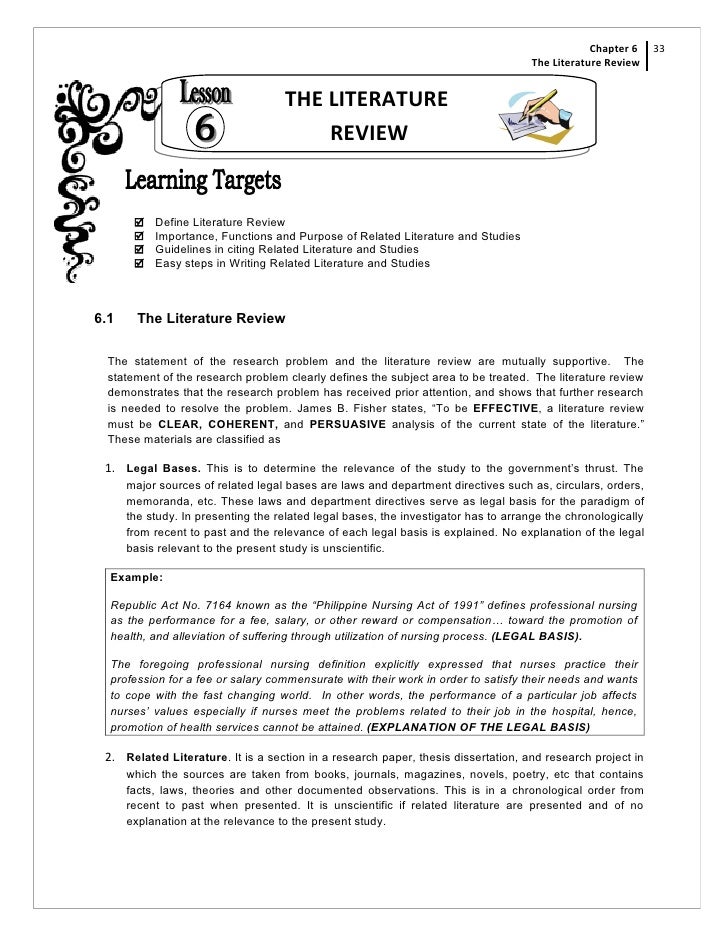





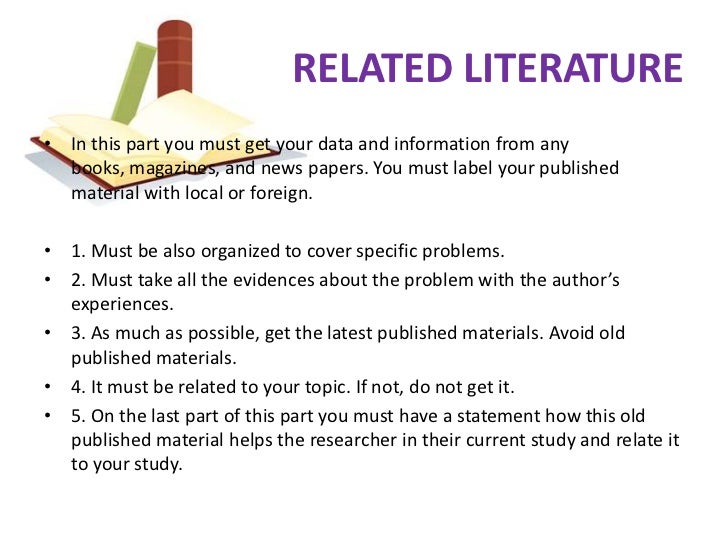


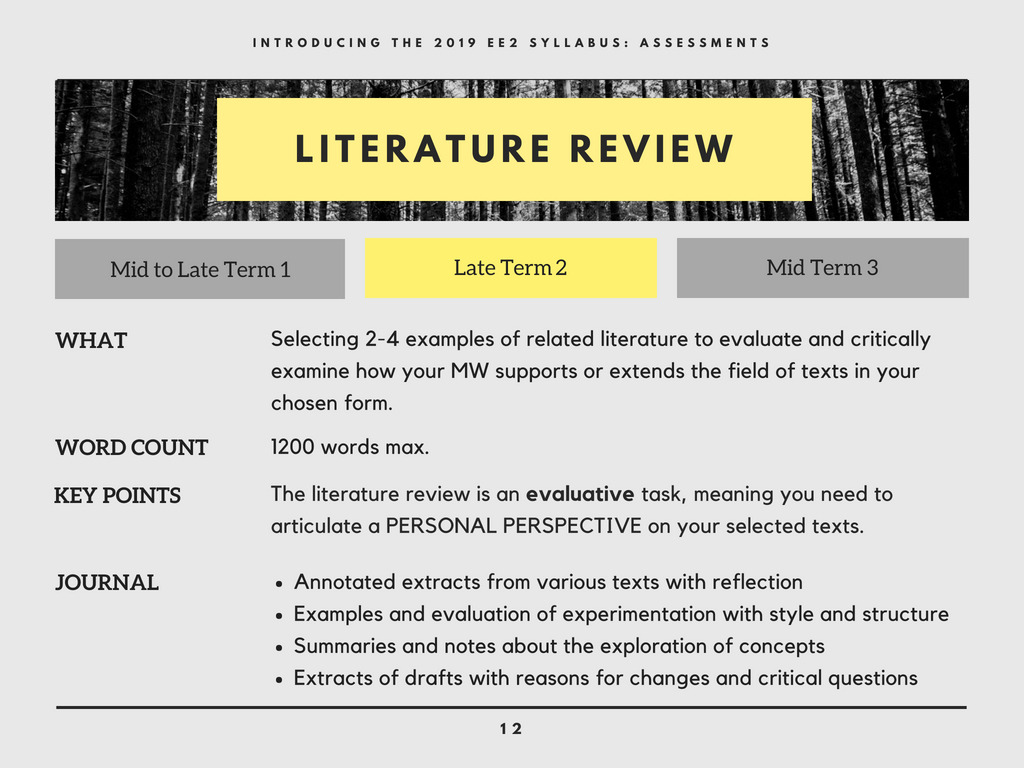
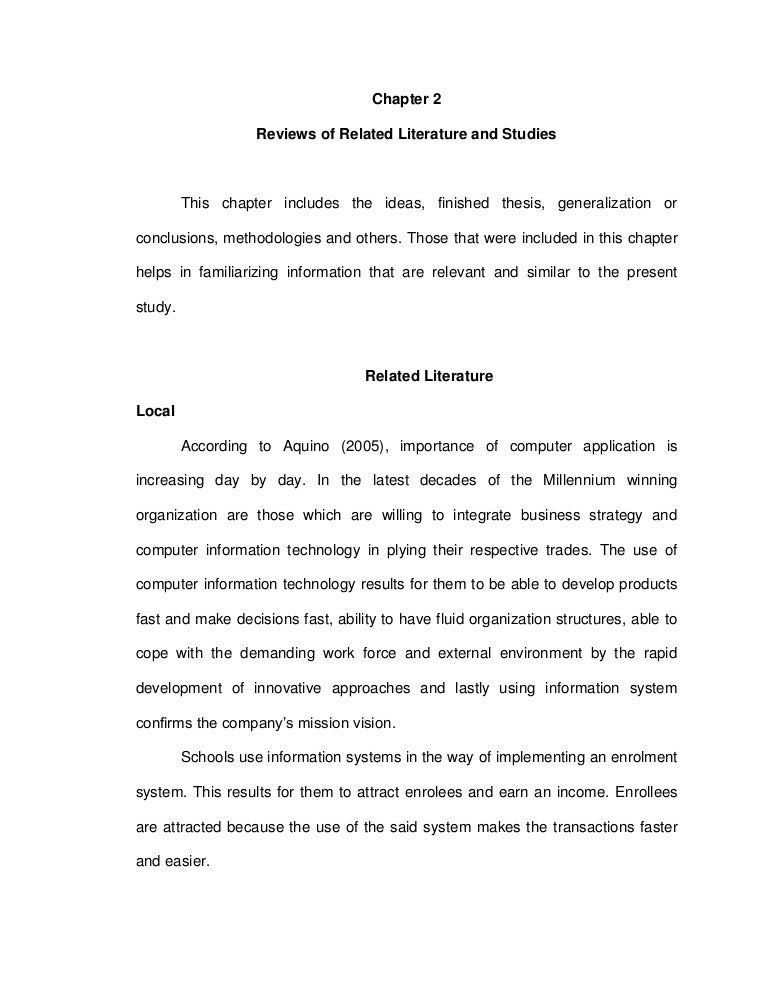





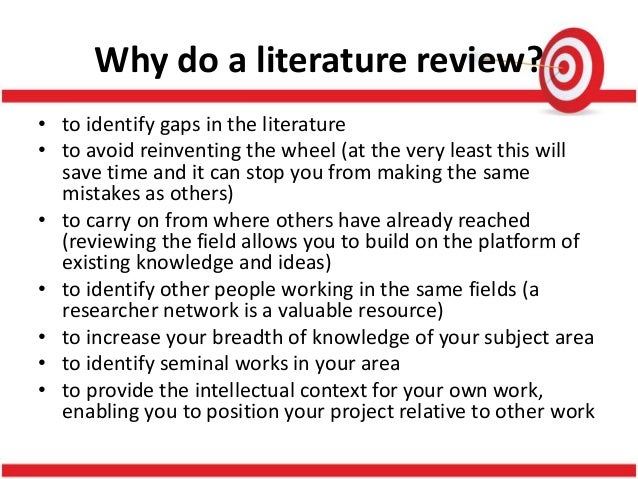










No comments:
Post a Comment
Note: Only a member of this blog may post a comment.